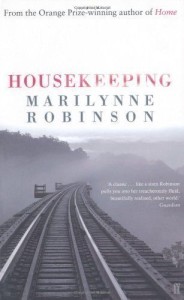
I read this first novel by the author of the Gilead series a long time ago. Or rather, I sank into it, stunned by its richness. Sisters Ruth and Lucille are being brought up by their grandmother on the outskirts of Fingerbone, a small town uncomfortably situated on a lake somewhere in the northwest part of the U.S. “It is true that one is always aware of the lake in Fingerbone, or the deeps of the lake, the lightless, airless waters below.”
Whether it is flooding the town or receding into its secrets, the lake is a powerful force. The girls’ grandfather died when his train ran off the bridge over the lake, and their mother, after dropping them at their grandmother’s, drove off a cliff into the same lake.
After their grandmother, who retained a few social ties with the town, dies, Aunt Sylvie takes over caring for the girls. However, her idea of providing for them is to hoard empty cans and newspapers, to buy them sparkly pink slippers instead of school clothes. Sylvie prefers the windows open and the lights off, regardless of the season or clock.
With Ruthie as our guide, we experience the wonders and costs of eccentricity. The girls must carry their losses and construct a way to order their lives. They must decide whether to take refuge in the ordinary world or remain open to the revelations that it masks.
On this second reading, I was again entranced by the voice of the novel. Slightly old-fashioned, deliberate, unsentimental, it not only adds substance to the strangeness of this household, but also moves fluidly between actual description and metaphysical exploration. Details—unexpected, alive, perfect—make it work. For example Ruth describes the scenes her grandfather painted on the bed, chest and wardrobe he made, and then says:
Each of these designs had been thought better of and painted out, but over years the white paint had absorbed them, floated them up just beneath the surface. I was always reminded of pictures, images, in places where images never were, in marble, in the blue net of veins at my wrists, in the pearled walls of seashells.
This time I was better able to appreciate the extraordinary choreography of the book. In only the second paragraph we are told:
The terrain on which the town itself is built is relatively level, having once belonged to the lake. It seems there was a time when the dimensions of things modified themselves, leaving a number of puzzling margins, as between the mountains as they must have been and the mountains as they are now, or between the lake as it once was and the lake as it is now. Sometimes in the spring the old lake will return.
Margins such as these—fluid, unstable, unreliable—are explored throughout the book. The sounds in the night may be ghosts or crickets. Perhaps what has disappeared may be distilled by remembering, desolation healed by creating small strongholds. Perhaps even the most final margin would yield to someone like Sylvie who “felt the life of perished things.”
There are a few other images that also recur in the story, accruing meaning, adjusting our perception of the characters and their choices. This is an element of creative writing that I particularly enjoy, and Robinson handles it beautifully.
What really makes this unusual story work, for me anyway, is the absence of censure. The townspeople may judge Sylvie, the mother, the girls, but the author does not. There are only choices, neither good nor bad, just choices.
I look forward to reading this book again in a few years. Who knows what I will find?
Have you reread a favorite novel and found it even richer than you remembered?

I just reread Ruth Riechl’s memoire: “Tender at the Bone.” The second reading made me more aware of how she finally came to terms with her mother’s bipolar condition and recognized the positive influence of her grandmother. The variety of characters is rich and the writing is out loud funny most of the time.
Thanks! I’ll look for that. I especially like when a writer manages to fold humor into a difficult situation.